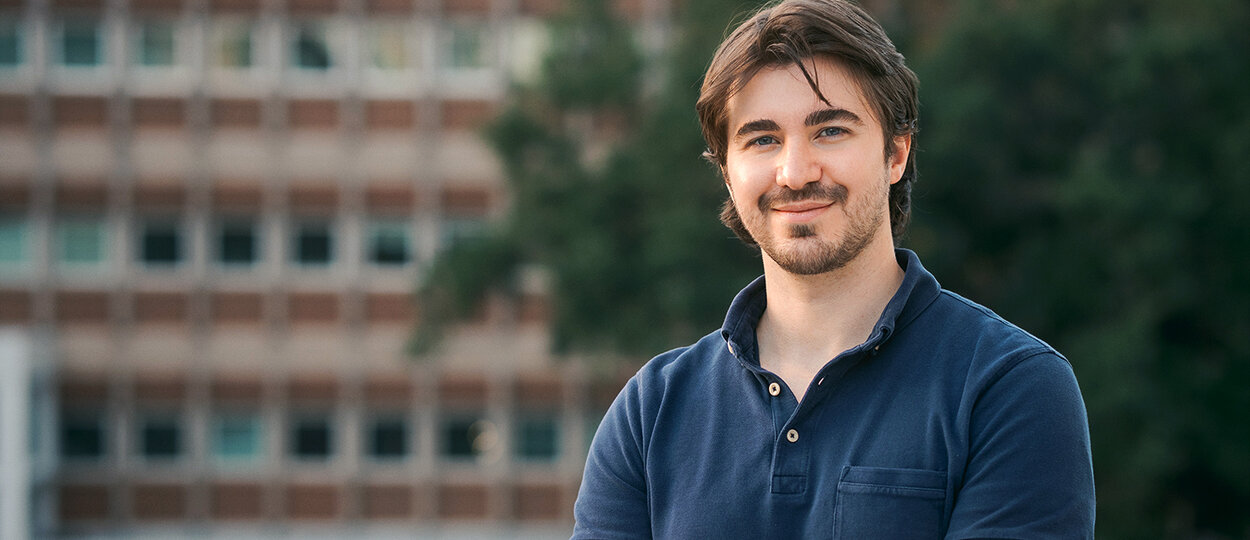Adam Koebel uses key communication skills gained during PhD to launch new career in science communication
Adam Koebel, a recent Pharmaceutical Sciences PhD graduate from U of T’s Leslie Dan Faculty of Pharmacy, is turning his pandemic hobby into a new career focused on science communication. He is combining the communication skills gained from his time at the Faculty with his new-found interest in animation and video production to help teach the public complex scientific concepts.
“Through doing the PhD, presenting graduate student seminars and listening to professionals all around the world talk about their research, I could put all of these learnings together and become a better communicator myself,” Koebel says. “This has been very valuable for me now that I’m getting into science communication.”
Koebel earned his Bachelor of Science in kinesiology in 2015 at Wilfrid Laurier University, where he conducted clinical research working to improve quality of life for patients with Parkinson’s disease. When he graduated, he wanted to gain experience in more basic science and medicinal chemistry. That fall, he started a Master of Science degree at the Leslie Dan Faculty of Pharmacy with Professor Lakshmi Kotra, and soon transitioned to a PhD.
“Working directly with patients was a very rewarding and meaningful experience, but I always felt I could have more of impact if I went into translational research,” says Koebel. “I also had a strong background and interest in chemistry and working with Professor Kotra allowed me to combine that interest with my background in neuroscience to explore new avenues.”
During Koebel’s graduate studies, his research was focused on investigating small molecules to treat neurodegeneration in the brains of people with multiple sclerosis (MS), using mouse models of the disease. In the Kotra laboratory, Koebel worked to design and synthesize small molecules to inhibit enzymes found at higher levels in MS brains and may be involved in disease progression, then tested the best candidates in animal models to understand their impact. The research was ultimately licensed by a start-up company to further develop the small molecules into potential therapeutics, and Koebel defended his dissertation in October 2021.
Interdisciplinary Faculty helps hone communication skills
Since finishing his PhD research, Koebel has decided to pursue a new career path in science communication, which he says is largely due to the training he received at the Leslie Dan Faculty of Pharmacy.
“I really enjoy talking about science and taking complex ideas and explaining them in a short amount of time."
Early in the COVID-19 pandemic, Koebel and his spouse, Marta Overchuk, started experimenting with producing videos to communicate scientific ideas such as CAR-T cells, tissue engineering and nanomedicines. They posted the videos on Overchuk’s Instagram account, @martaoverchuk, and found that there was significant interest in their content, with many of their videos being viewed hundreds of thousands of times.
“I really enjoy talking about science and taking complex ideas and explaining them in a short amount of time. We can actually improve the public’s opinion of science and scientists by engaging with them through social media,” says Koebel. “We’ve had a lot of interest in our videos. It’s been very powerful and has pushed me in that direction.”
Koebel is now based in Chapel Hill, North Carolina, where Overchuk started a post-doctoral fellowship at the University of North Carolina in March 2022. Koebel is currently pursuing science communication on a freelance basis with plans to start a small communications company.
Having a variety of disciplines based at the Leslie Dan Faculty of Pharmacy, ranging from basic science to clinical care, provided critical opportunities for Koebel to improve both his research and communication. He presented at different conferences and seminars and was a TA for a course in the Doctor of Pharmacy curriculum, which allowed him to hone his communication skills with people outside his area of expertise.
“When you talk with people from different disciplines and backgrounds, you broaden your ability in fundamental skills like communication,” he says. “It was a bit intimidating at first, but I really came to appreciate the diversity of disciplines and opinions from other students and faculty who could provide insights as I conducted my research. Having access to so many different disciplines in the Faculty ended up having a huge impact on me and my career.”
More News
Image

PharmD student receives Volunteer Award from Life Sciences Ontario
Simonne Rauch is recognized for her contributions to ambassador and mentorship programs.
Read More
Image

Celebrating Excellence: Mike Folinas Receives 2024-25 Exemplary U of T Ambassador Award
Mike Folinas has received the 2024–25 Exemplary U of T Ambassador Award for his outstanding service and leadership in supporting the academic community.
Read More
Image

Structural biology research takes aim at rare neurodegenerative disease
Rachel Harding leads research to understand protein responsible for Huntington’s disease and advance drug discovery
Read More
